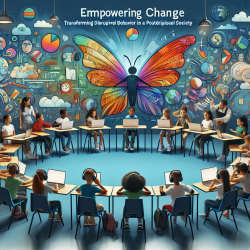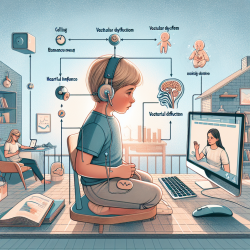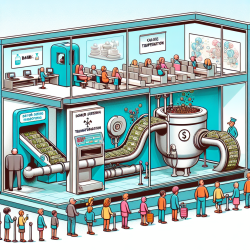Introduction
In today's rapidly evolving society, managing disruptive behavior has become a complex challenge for educators and therapists. The research article "Disruptive Behavior in the Postdisciplinary Society" by Gaete-Silva and Gaete (2021) provides valuable insights into understanding and addressing these behaviors in the context of a postdisciplinary society. This blog explores how practitioners can apply these findings to improve outcomes for children, particularly in educational settings.
Understanding Disruptive Behavior in a Postdisciplinary Context
The concept of disruptive behavior (DB) is not new, but its interpretation and management have evolved significantly. Historically, disciplinary societies relied on punitive measures to control such behaviors. However, these methods have lost legitimacy in today's pluralistic and democratic societies, where social justice and inclusivity are prioritized.
Gaete-Silva and Gaete (2021) argue that the rise of a postdisciplinary society has led to a proliferation of problematic disruptive behavior (PDB). This shift is attributed to a moral transition in ideas of justice, authority, and personal entitlements. Traditional responses to disruption, such as punishment, are now seen as exacerbating the problem rather than resolving it.
Implementing Transformative Approaches
To address PDB effectively, practitioners are encouraged to adopt transformative approaches that emphasize understanding and inclusivity. Here are some strategies derived from the research:
- Adopt a Tentative Stance: Practitioners should avoid immediate judgments and instead adopt a stance of "transforming tentativeness." This involves deferring strong evaluations and exploring the underlying causes of disruptive behavior through open dialogue.
- Foster Participatory Parity: Encourage participatory parity by recognizing and valuing diverse perspectives. This approach aligns with the postdisciplinary emphasis on social justice and inclusivity.
- Promote Collaborative Inquiry: Engage in collaborative inquiry with students, parents, and colleagues to co-create solutions that address the root causes of disruptive behavior.
Encouraging Further Research
While the research provides a solid foundation for understanding and managing PDB, there is a need for further empirical studies to refine these approaches. Practitioners are encouraged to contribute to this body of knowledge by documenting their experiences and sharing best practices.
Conclusion
In a postdisciplinary society, managing disruptive behavior requires a shift from punitive measures to transformative approaches that prioritize understanding, inclusivity, and collaboration. By implementing these strategies, practitioners can create more supportive and effective educational environments for children.
To read the original research paper, please follow this link: Disruptive Behavior in the Postdisciplinary Society.










